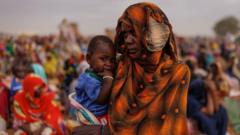Chad has reacted strongly to a senior Sudanese general's declaration to target its airports, labeling it an outright "declaration of war." This follows accusations from Lt-Gen Yasir al-Atta, deputy commander of Sudan's army, who claims Chad is being utilized for weapons transport to the paramilitary Rapid Support Forces (RSF) with support from the UAE.
**Chad Brands Sudan's Airport Threat as 'War Declaration' Amidst Escalating Regional Tensions**

**Chad Brands Sudan's Airport Threat as 'War Declaration' Amidst Escalating Regional Tensions**
Chad's government issues a stern response to Sudan's military threats, highlighting escalating regional instability and humanitarian crises.
Chad's foreign ministry stated that if any "square metre of Chadian territory is threatened," it would respond under international law. Al-Atta's comments coincide with Sudan's decision to file a complaint against the UAE in the International Court of Justice regarding its alleged support of the RSF in the ongoing civil war catastrophe that has caused a dire humanitarian crisis in the region.
In a recent address following the death of an army officer in an RSF drone attack, Lt-Gen Atta labeled airports in Chad as "legitimate targets," vowing retaliatory action against both Chad and South Sudan. Both of these neighboring nations have been accused of allowing support for the RSF, allegations they vehemently deny.
Chad has attempted to remain neutral in this multifaceted conflict, but the increasingly harsh rhetoric from Sudan reveals the regional instability prompted by prolonged violence. The Sudanese army is growing increasingly frustrated with neighboring countries allegedly permitting their land to be used as logistics routes for the RSF.
Chad has emphasized the importance of pursuing peace, urging adherence to a ceasefire and constructive dialogue, especially considering its role in hosting hundreds of thousands of Sudanese refugees fleeing the violence. Recent developments highlight the RSF seizing control of strategic towns in Darfur—a vital area connecting Chad and Libya—amid escalating military confrontations with other armed groups aligned with the Sudanese army.
On the ground, local activists report alarming humanitarian conditions in towns like al-Malha, which the RSF has captured. Limited access to essential services like medical care and clean water have left many in dire situations. Refugees escaping the violence recount severe deaths and atrocities, particularly targeting those affiliated with the rival forces.
The ambitions of the RSF underline complexities around the ongoing conflict, with Gen Mohamed Hamdan Dagalo, better known as Hemedti, vowing continued resistance despite setbacks from the Sudanese army's advances in Khartoum. Observers worry that this enduring struggle may risk de facto partition, as conflicting parties dig in within their respective territories amidst a rising tide of regional discord.
In a recent address following the death of an army officer in an RSF drone attack, Lt-Gen Atta labeled airports in Chad as "legitimate targets," vowing retaliatory action against both Chad and South Sudan. Both of these neighboring nations have been accused of allowing support for the RSF, allegations they vehemently deny.
Chad has attempted to remain neutral in this multifaceted conflict, but the increasingly harsh rhetoric from Sudan reveals the regional instability prompted by prolonged violence. The Sudanese army is growing increasingly frustrated with neighboring countries allegedly permitting their land to be used as logistics routes for the RSF.
Chad has emphasized the importance of pursuing peace, urging adherence to a ceasefire and constructive dialogue, especially considering its role in hosting hundreds of thousands of Sudanese refugees fleeing the violence. Recent developments highlight the RSF seizing control of strategic towns in Darfur—a vital area connecting Chad and Libya—amid escalating military confrontations with other armed groups aligned with the Sudanese army.
On the ground, local activists report alarming humanitarian conditions in towns like al-Malha, which the RSF has captured. Limited access to essential services like medical care and clean water have left many in dire situations. Refugees escaping the violence recount severe deaths and atrocities, particularly targeting those affiliated with the rival forces.
The ambitions of the RSF underline complexities around the ongoing conflict, with Gen Mohamed Hamdan Dagalo, better known as Hemedti, vowing continued resistance despite setbacks from the Sudanese army's advances in Khartoum. Observers worry that this enduring struggle may risk de facto partition, as conflicting parties dig in within their respective territories amidst a rising tide of regional discord.



















